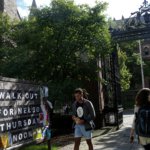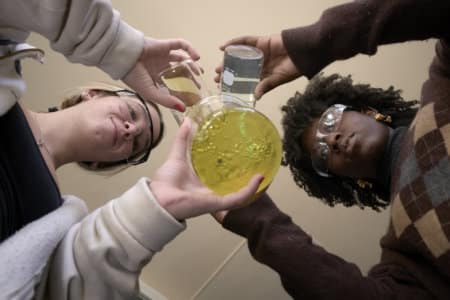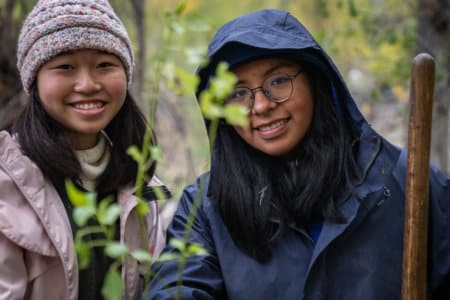Education at UWC-USA goes beyond the books – it’s a force to unite people, nations and cultures for peace and a sustainable future. Part of a global movement, this high school is located on the edge of the Pecos Wilderness and the Santa Fe National Forest, a strategic enclave for the student-focused and nature-based learning that takes place here. Together with 230 students from 95 countries, 16 to 18 years old students live, study, and explore before graduating as agents of change and become young adults prepared to make a difference in the next stage of their lives.
A high school for a higher purpose
Becoming the difference in a complex world starts with a strong foundation. The International Baccalaureate (IB) Diploma Programme, which asks students to explore and understand how they know what they know, provides this. The IB sets out to create inquiring, knowledgeable and caring young people who help to create a better and more peaceful world. The curriculum covers a wide breadth of academic inquiry and emphasizes the skills of creative problem-solving, collaboration, cross-cultural communication, and experience-based learning. It is one of the most comprehensive and challenging college preparatory curricula in the world and UWC-USA was amongst the first to offer it in the US.
Each year, 115 new students join the two-year programme. Three-fourths come from outside the US, representing 90 different nationalities and a range of financial backgrounds and lived realities. They contribute varied perspectives and cultural insights to any subject area.
“I absolutely love my Global Politics class. Every session is like a global conference,” says student Minseo from South Korea. “Students from different cultures bring their unique stories, insights, and perspectives, enriching our discussions and expanding our understanding of global issues. This diversity in the classroom not only keeps our discussions fascinating but also teaches us how to appreciate each other’s differences.”

Students come from all walks of life and come together to contribute varied perspectives and cultural insights to any subject area. Source: UWC-USA
Learning by doing, performing and serving
Like the IBDP, programmes outside the classroom also emphasise collaboration, training students to dissolve barriers of language, politics, and culture in favor of learning to seek areas of commonality.
The Arts and Culture Signature Programme, for example, gets students, from beginner to advanced, taking part in dance, music, theatre, literary arts, visual arts, and media arts. Expert instructors guide students to hone their passions, explore new genres and connect them across subject areas. “UWC-USA opens doors and gave me access to activities I had never heard of before,” says student Camille.
Supported by the performance-based CAS (Creativity Activity, Service) offerings, these opportunities are as transformative as they are experiential. In addition to IB Arts classes, students are free to explore a wide number of interests. A former student took part in Soccer Co-Ed, Youth Detention Centre, Volleyball, African Chorus, Percussion, Ensemble, Silk Road Ensemble, Music Improv, Buenos Para Todos, Youth Global Citizen Exchange Program, Global Chorus Advanced Section, Math Center, Tech Lighting, during his two years here. Campus extends into a rugged and beautiful backcountry of national forests where students learn leadership and safety skills through UWC-USA’s Wilderness Programme. Backpacking, river-walking, and camping are just a few of the activities in which students discover untapped potential and resilience.
“One specific out-of-the-classroom activity that I particularly enjoyed was my Southwest Studies trip to the Grand Canyon,” says Korbin, a student from the US. He remembers the four rigorous days it took, each filled with deep conversations, laughter and food from new friends from different countries. “What I found most enjoyable was how it allowed me to learn more about the geography and culture of the American Southwest, while also challenging myself beyond what was possible before UWC.”
The world as your platform
Programmes and workshops provide more avenues for students to engage in the UWC mission and the work of the school. The Constructive Engagement of Conflict (CEC) programme gets students working with community centres, marginalised groups, incarcerated people at the local detention centre and more. The three-week summer youth programme gives participants the leadership skills necessary to plan and execute a project that addresses a social justice challenge in their home community. Each opens a door to peacemaking, conflict resolution, goal-setting, and collaboration — valuable experiences that are rarely offered by other schools.
“During a trip to the Hopi nation, I learned about indigenous people, their land and how their rights are violated,” says Lucas, a student from Belarus. “I had meaningful conversations with them and helped clean a portion of land. Afterwards, I wrote a paper on the Hopi nation, and the experience taught me to value the land we live on and to acknowledge to whom it belongs.”
Every year, students and faculty at UWC-USA perform 17,000 hours of community service — on top of contributions to local school committees, watershed councils, and the boards of local non-profits.

The outdoors is a living laboratory, perfect for students to develop leadership skills. Source: UWC-USA
A campus that celebrates differences
At UWC-USA, the world is your school. The campus spans 200 acres and features academic buildings, resident houses, an auditorium, faculty housing, playing fields, tennis courts, and offices for staff.
“Students here are very open-minded and have a real desire to learn – not just in class, but also in everyday life on topics such as culture, traditions, and foods of those from around the world,” says Catalina, who hails from Australia.
Teachers play a key role in maintaining this powerful support network. Constricting hierarchies don’t have a place here, allowing faculty to invite students into their homes, cook together, go on hikes on the weekend, and have the chance to learn from each other. Many of these relationships last long after students have graduated.
“The students at UWC are different from any other students I have worked with in the best way possible,” says student Lydia. “They are some of the most talented, motivated, and accomplished people I have ever met. They are always eager to take on any challenge, whether inside or outside the classroom.”
Learn more about UWC-USA’s impact.
Follow UWC-USA on Facebook, X, Instagram, LinkedIn and YouTube












